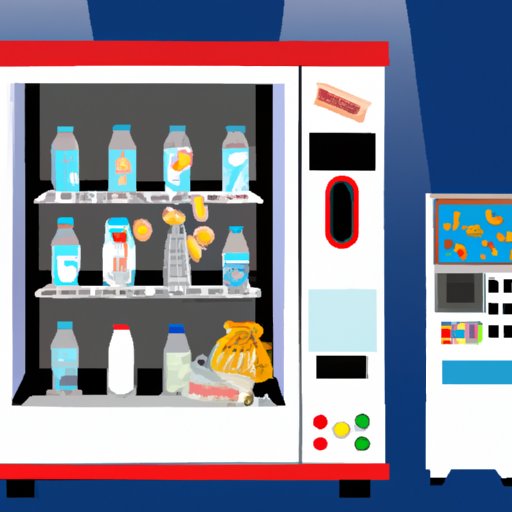Introduction
Vending machines are a great way to make money while providing convenient access to products. With the right research and planning, starting a vending machine business can be a lucrative investment. This guide will provide information on the initial investment, legal requirements, and best practices for launching a successful vending machine business.
Overview of Vending Machines
A vending machine is an automated machine that dispenses items such as snacks, beverages, and other products when a customer inserts money or a credit card. Vending machines are typically found in public places such as shopping malls, airports, gas stations, and office buildings. According to a survey conducted by the National Automatic Merchandising Association (NAMA), there were more than 5 million vending machines in the United States in 2018.
Benefits of Starting a Vending Machine Business
The vending machine business offers many advantages to prospective entrepreneurs. It requires minimal startup costs and overhead expenses, and it has the potential to generate a steady stream of income. According to a study by the University of Minnesota Extension, “the average annual gross revenue per vending machine ranges from $4,000 to $20,000.” Additionally, the vending machine industry offers flexibility since owners can choose their own hours and locations.
Outline the Startup Costs and Financing Options for Starting a Vending Machine Business
Before starting a vending machine business, it’s important to understand the initial investment and financing options. The startup costs will vary depending on the type and number of vending machines purchased and the locations chosen. Generally, the startup costs include the cost of purchasing or leasing vending machines, obtaining insurance, and registering the business with the appropriate state agencies. Additionally, owners should factor in the ongoing costs associated with restocking the vending machines, maintaining the machines, and paying any applicable fees or taxes.
Financing options for starting a vending machine business include taking out a loan, using personal funds, or seeking investors. Prospective entrepreneurs should research different financing options to determine which one best meets their needs. It’s also important to consider the terms and conditions of each option before making a decision.

Identify the Best Locations for Placing Vending Machines
Location is key to the success of a vending machine business. When selecting locations, owners should consider factors such as foot traffic, demographics of the area, proximity to other businesses, and ease of access. Owners should also research potential locations to determine whether they have any restrictions on vending machine placement. Additionally, owners should strive to place their machines in areas where there is a high demand for the products being offered.

Calculate the Profitability Potential for a Vending Machine Business
To calculate the profitability potential of a vending machine business, owners need to estimate the anticipated revenue, cost of goods sold, and profit margin. Anticipated revenue is determined by estimating how much customers will spend on products from the vending machine. Cost of goods sold includes the cost of purchasing or leasing the vending machines, restocking the machines, and any associated fees or taxes. Profit margin is calculated by subtracting the cost of goods sold from the anticipated revenue.
Discuss the Legal Requirements for Starting a Vending Machine Business
Owners must meet certain legal requirements when starting a vending machine business. Depending on the state, owners may need to obtain a business license and other permits before placing vending machines in public locations. Additionally, owners should carry liability insurance to protect against potential lawsuits. Finally, owners should familiarize themselves with any local regulations or laws that may apply to their business.

Provide Tips for Choosing the Right Vending Machines
When selecting vending machines, owners should consider the size and capacity of the machine, the type of product it dispenses, and any security features it has. For example, larger vending machines can hold more products and may be better suited for higher-traffic locations, while smaller machines may be better suited for low-traffic locations. Additionally, owners should select machines that offer features such as cashless payment and remote monitoring.

Explain How to Source Quality Products for Vending Machines
When sourcing products for vending machines, owners should develop good relationships with suppliers to ensure quality and consistency. Owners should also compare prices to get the best deal and should be aware of any expiration dates or other restrictions on the products they are selling. Additionally, owners should take into account the preferences of the local market when selecting products.
Offer Advice on Effective Advertising Strategies for Vending Machines
Advertising is an important part of running a successful vending machine business. Owners should consider traditional advertising methods such as flyers, posters, and newspaper ads. Additionally, owners should invest in digital marketing techniques such as email campaigns, search engine optimization (SEO), and social media marketing. These strategies can help attract new customers and increase sales.
Conclusion
Starting a vending machine business can be a lucrative venture with minimal upfront costs. To have a successful business, owners should consider the initial investment, legal requirements, and best practices for choosing the right machines and sourcing quality products. Additionally, owners should implement effective advertising strategies to maximize their profits. With the right research and planning, anyone can launch a successful vending machine business.
(Note: Is this article not meeting your expectations? Do you have knowledge or insights to share? Unlock new opportunities and expand your reach by joining our authors team. Click Registration to join us and share your expertise with our readers.)
